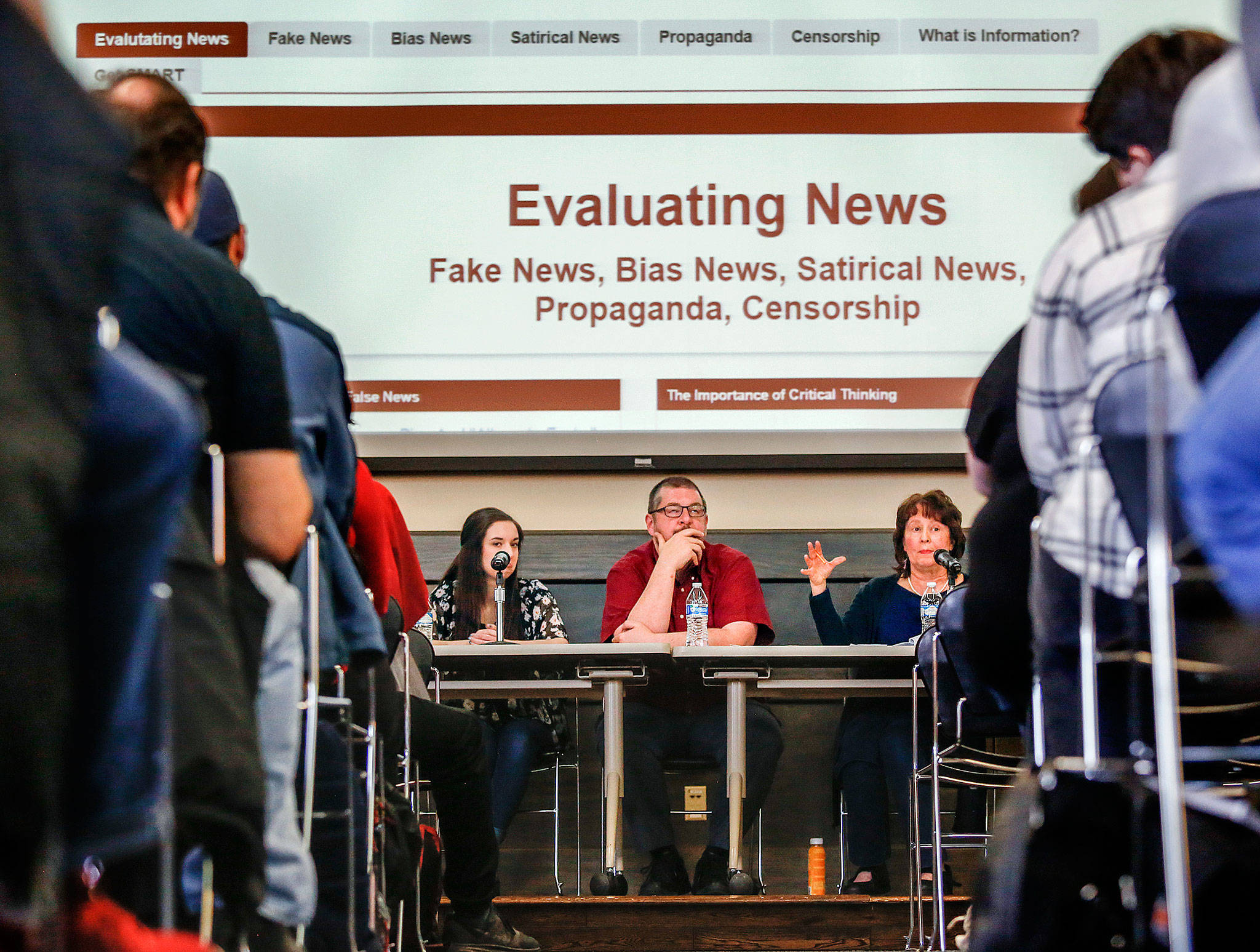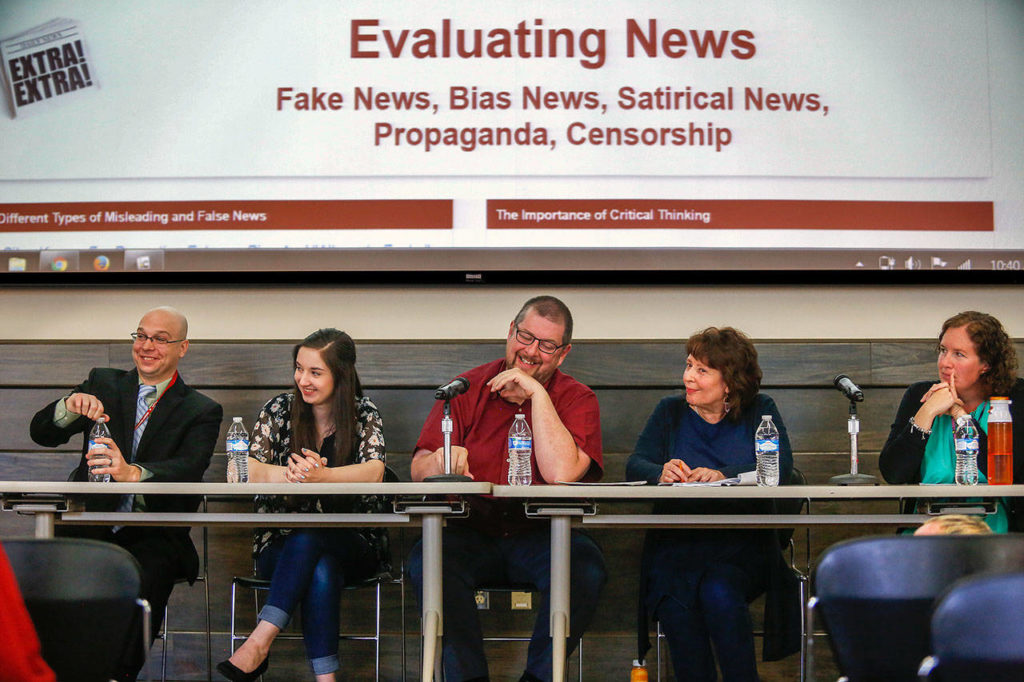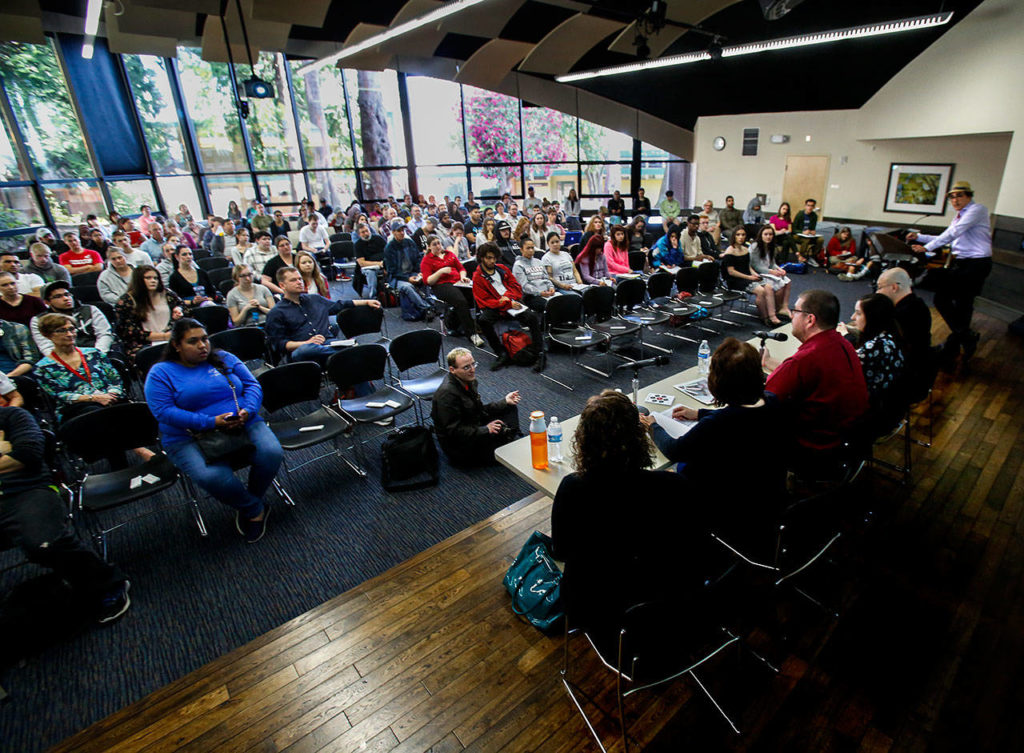We get our news primarily from social media. That assertion, by an Everett Community College journalism instructor, was aimed at students, not my demographic. Even so, it’s a jarring thought.
It’s also good reason for a frank talk about fake news.
In two sessions Tuesday, EvCC hosted panel discussions on finding truth in an era when even facts are called into question. Fake news and bias, filter bubbles and the quest for real information were key topics at gatherings that filled the Wilderness Room at the Henry M. Jackson Center on campus.
Abby Tutor, editor of The Clipper student newspaper, was joined on the panel by several EvCC faculty members: journalism instructor T. Andrew Wahl, computer information systems instructor Dennis Skarr, English instructor Andrea Wells-Edwards, and librarian Teresa Jones. Zaki Hamid, who teaches media communication and film, moderated the panel.
The group explored differences between satire a la Jon Stewart or Stephen Colbert, propaganda, unintended mistakes and what Skarr said is actually fake news — intended to deceive.
Skarr teaches information technology security and cyber warfare at EvCC, and also serves in the Washington Air National Guard. He said Russia’s attempts to meddle with elections have been aimed at the United States, France and Germany.
Russia’s intent to favor one candidate over another has included leaked emails, and spreading articles written to look like news out to conspiracy-theory websites, he said. “It’s republished and bubbles up into the mainstream,” Skarr said.
“Awareness is a good place to be with fake news,” Tutor, the student editor, said. With a habit of practicing media literacy, she said that “once you know different things to look for, it becomes second nature.”
The college library offers an online guide for evaluating information. News consumers are advised to consider the source and supporting sources, read beyond click-bait headlines, and be sure an item isn’t a joke. Wahl said a good test is to ask, “Who is this person serving? It has to be the audience.”
“What journalists do is serve the community,” he added.
In her English classes, Wells-Edwards said students use a “CRAP” test for gauging sources — with the acronym meaning currency, reliability, authority and purpose or point of view.
Hamid, an immigrant from Jordan who came here in 1994, said he became a U.S. citizen two months before the 9/11 attacks. “I am an American before anything else,” he said.
“Seeking out a different view is really important. When I came here I made a conscious choice to do that,” Hamid said. He suggested that students read works from cultures different from their own.
Wahl spoke about filter bubbles. “We self-select, on Facebook or Twitter, who we follow,” he said. Those online friends “reaffirm our world.” Technology, through algorithms, strengthens the filter bubbles.
On Facebook, “if a person likes liberal news, then they get more liberal news,” Wahl said. “If they like conspiracy, they get more conspiracy. And we get more and more divisiveness.”
Tutor said it’s time to do away with the notion that polite conversation doesn’t include politics. “We have to be on a path to being more open-minded,” she said.
The young audience didn’t include many newspaper readers. Katherine Schiffner, the college public relations director, said EvCC joins in an annual survey of community and technical college students to learn how students would like to hear from the school.
In the survey conducted Sept. 26-Nov. 11, students ages 16 to 20 were asked about newspaper readership. Of 438 responses, 58 percent responded that they never read a printed daily newspaper — never. And 23 percent said they seldom do.
And a daily local newspaper online? Of 434 answering, 51 percent said never, 26 percent said seldom, and just 2 percent said always.
“A generation ago, it was a shared experience,” Wahl said. And while the internet can be wonderful, “it broke the business model” for newspapers, he said. “Good reporting costs money.”
Since taking office, President Donald Trump repeatedly has attacked journalists. In a February tweet, he labeled the news media “the enemy of the American People.”
“I never thought my president would brand me the enemy of the nation,” Wahl said. Yet he sees cause for hope.
“Information is power. You all have technology. Anyone can start a blog,” Wahl told students Tuesday. “You have the ability to lead us to a better place.”
Julie Muhlstein: 425-339-3460; jmuhlstein@heraldnet.com.
‘Crazy Politics’ talk Saturday
Cornell Clayton, political science professor and director of the Thomas S. Foley Institute for Public Policy and Public Service at Washington State University, is scheduled to present a program, “Crazy Politics: Populism, Conspiracy Theories, and Paranoia in America,” 2-3 p.m. Saturday at the Monroe Library, 1070 Village Way, Monroe. The free event is funded by Humanities Washington and Friends of the Monroe Library.
Talk to us
> Give us your news tips.
> Send us a letter to the editor.
> More Herald contact information.



























